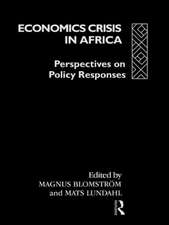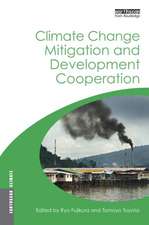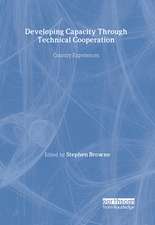Value Chains, Social Inclusion and Economic Development: Contrasting Theories and Realities: Routledge Studies in Development Economics
Editat de A.H.J. Helmsing, Sietze Vellemaen Limba Engleză Paperback – 9 dec 2016
Policy makers and development practitioners are increasingly using value chain analysis to frame pro-poor development interventions. This book offers multiple conceptualizations of development outcomes of inclusion of small producers, firms and workers in value chains. Processes of inclusion at different scales are unpacked in order to identify the terms of participation of small producers, firms and workers. As value chains are embedded, the book further argues that inclusion can be conceptualized as the degree of alignment between value chain logics and the institutions and capacities in the local business system. The combination of inclusive governance and endogenous development informs a grounded debate on roles of development-oriented partnerships.
Chapters in this volume draw on multiple strands of economics, sociology, political science, geography and management studies; and for empirical grounding engage in comparative analysis of cases from Latin America, SubSaharan Africa and East and South East Asia. These are combined with processes taking place at a global level, such as the proliferation of standards and the growth of roundtables and multi-stakeholder partnerships. The contributions explore contrasts – between contexts, between industries or commodities/products, and between conceptual frameworks; and the context dependency of development impact necessitates cross-case investigations. This collection will be of interest to scholars in development studies, economics, business studies, as well as to development policy makers.
| Toate formatele și edițiile | Preț | Express |
|---|---|---|
| Paperback (1) | 394.38 lei 22-36 zile | +22.67 lei 6-12 zile |
| Taylor & Francis – 9 dec 2016 | 394.38 lei 22-36 zile | +22.67 lei 6-12 zile |
| Hardback (1) | 1064.70 lei 43-57 zile | |
| Taylor & Francis – 24 mai 2011 | 1064.70 lei 43-57 zile |
Din seria Routledge Studies in Development Economics
-
 Preț: 309.74 lei
Preț: 309.74 lei -
 Preț: 327.17 lei
Preț: 327.17 lei -
 Preț: 326.49 lei
Preț: 326.49 lei -
 Preț: 311.41 lei
Preț: 311.41 lei - 8%
 Preț: 396.85 lei
Preț: 396.85 lei -
 Preț: 268.36 lei
Preț: 268.36 lei - 18%
 Preț: 1165.24 lei
Preț: 1165.24 lei - 15%
 Preț: 470.31 lei
Preț: 470.31 lei - 18%
 Preț: 1057.05 lei
Preț: 1057.05 lei - 18%
 Preț: 1225.29 lei
Preț: 1225.29 lei - 18%
 Preț: 1113.63 lei
Preț: 1113.63 lei - 18%
 Preț: 1300.62 lei
Preț: 1300.62 lei - 28%
 Preț: 878.42 lei
Preț: 878.42 lei - 18%
 Preț: 1166.05 lei
Preț: 1166.05 lei - 18%
 Preț: 1059.45 lei
Preț: 1059.45 lei -
 Preț: 381.11 lei
Preț: 381.11 lei - 28%
 Preț: 823.63 lei
Preț: 823.63 lei - 25%
 Preț: 361.84 lei
Preț: 361.84 lei - 20%
 Preț: 274.01 lei
Preț: 274.01 lei - 18%
 Preț: 1060.87 lei
Preț: 1060.87 lei - 18%
 Preț: 1168.85 lei
Preț: 1168.85 lei - 18%
 Preț: 1171.89 lei
Preț: 1171.89 lei - 18%
 Preț: 1068.18 lei
Preț: 1068.18 lei - 18%
 Preț: 1060.19 lei
Preț: 1060.19 lei - 18%
 Preț: 1341.98 lei
Preț: 1341.98 lei - 18%
 Preț: 1169.16 lei
Preț: 1169.16 lei - 18%
 Preț: 1057.05 lei
Preț: 1057.05 lei - 15%
 Preț: 708.81 lei
Preț: 708.81 lei - 18%
 Preț: 1287.06 lei
Preț: 1287.06 lei - 18%
 Preț: 1124.73 lei
Preț: 1124.73 lei - 18%
 Preț: 1157.34 lei
Preț: 1157.34 lei - 27%
 Preț: 832.80 lei
Preț: 832.80 lei - 28%
 Preț: 850.91 lei
Preț: 850.91 lei - 18%
 Preț: 1066.79 lei
Preț: 1066.79 lei - 25%
 Preț: 658.19 lei
Preț: 658.19 lei - 25%
 Preț: 992.63 lei
Preț: 992.63 lei - 18%
 Preț: 1069.23 lei
Preț: 1069.23 lei - 15%
 Preț: 703.08 lei
Preț: 703.08 lei -
 Preț: 395.63 lei
Preț: 395.63 lei - 18%
 Preț: 706.91 lei
Preț: 706.91 lei -
 Preț: 419.92 lei
Preț: 419.92 lei - 18%
 Preț: 1055.38 lei
Preț: 1055.38 lei - 27%
 Preț: 993.85 lei
Preț: 993.85 lei - 18%
 Preț: 707.10 lei
Preț: 707.10 lei -
 Preț: 409.19 lei
Preț: 409.19 lei
Preț: 394.38 lei
Nou
Puncte Express: 592
Preț estimativ în valută:
75.49€ • 82.02$ • 63.45£
75.49€ • 82.02$ • 63.45£
Carte disponibilă
Livrare economică 31 martie-14 aprilie
Livrare express 15-21 martie pentru 32.66 lei
Preluare comenzi: 021 569.72.76
Specificații
ISBN-13: 9781138244009
ISBN-10: 1138244007
Pagini: 312
Ilustrații: 34
Dimensiuni: 156 x 234 x 20 mm
Greutate: 0.45 kg
Ediția:1
Editura: Taylor & Francis
Colecția Routledge
Seria Routledge Studies in Development Economics
Locul publicării:Oxford, United Kingdom
ISBN-10: 1138244007
Pagini: 312
Ilustrații: 34
Dimensiuni: 156 x 234 x 20 mm
Greutate: 0.45 kg
Ediția:1
Editura: Taylor & Francis
Colecția Routledge
Seria Routledge Studies in Development Economics
Locul publicării:Oxford, United Kingdom
Public țintă
Postgraduate and UndergraduateNotă biografică
A.H.J. (Bert) Helmsing is Professor of Local and Regional Development, International Institute of Social Studies at Erasmus University Rotterdam, the Netherlands.
Sietze Vellema is Associate Professor at the Technology and Agrarian Development group of Wageningen University, the Netherlands, and Senior Researcher/Program Leader at their Agricultural Economics Research Institute.
Sietze Vellema is Associate Professor at the Technology and Agrarian Development group of Wageningen University, the Netherlands, and Senior Researcher/Program Leader at their Agricultural Economics Research Institute.
Cuprins
1. Governance, inclusion and embedding: raising the issues A.H.J. (Bert) Helmsing and Sietze Vellema Part 1: Governance and Inclusion 2. Unpacking the discourse on social inclusion in value chains Otto Hospes and Joy Clancy 3. Voluntary governance initiatives and the challenges of inclusion and upscaling Peter Knorringa, Gerdien Meijerink and Greetje Schouten 4. Comparing fair and responsible coffee standards in East Africa Ruerd Ruben and Simone Verkaart 5. Agricultural cooperatives and value chain coordination Jos Bijman, Roldan Muradian and Andrei Cechin 6. Labour in globalized agricultural value chains Lee Pegler, Karin Astrid Siegmann and Sietze Vellema 7. The Ghanaian state and inclusive upgrading in the global cocoa chain Anna Laven Part 2: Embedding and Business Systems 8. Business systems, value chains and inclusive regional development in South-East Asia Edo Andriesse, Niels Beerepoot, Bram van Helvoirt and Guus van Westen 9. Local embedding and economic crisis: comparing lobster chains in Belize, Jamaica and Nicaragua Iris Monnereau and A.H.J. (Bert) Helmsing 10. Governance and greening global agro-food chains: cases from Vietnam, Thailand and Benin Peter Oosterveer, Phan Van Hoi and Laurent C. Glin Part 3: Chain-based Partnerships for Development 11. Partnering to facilitate smallholder inclusion in value chains Verena Bitzer, Jeroen van Wijk, A.H.J. (Bert) Helmsing and Victor van der Linden 12. Upscaling of smallholder participation in global value chains Aad van Tilburg, Emma Kambewa, Andre de Jager and Davies Onduru 13. Building inclusive value chains in biotrade: a comparison of two cases from South America Roldan Muradian, Gerard Verschoor, Edgar Bolivar and German Ochoa
Descriere
Lead firms, development organisations, donors and governments view value chains and voluntary standards as vital instruments for achieving millennium development goals through trade and market-related interventions. The precise foundations for these development strategies, which suggest positive development outcomes from integration of poor actors into value chains, are as yet underdeveloped. The interdisciplinary work in this volume shows how trade is managed and asks theory-driven questions about how value chains relate to locally-rooted development processes.










